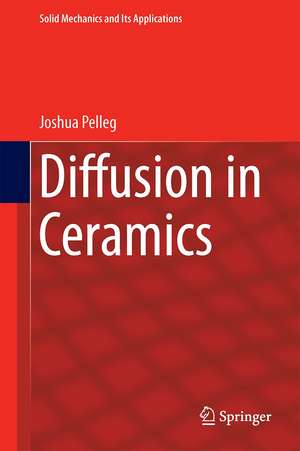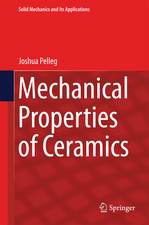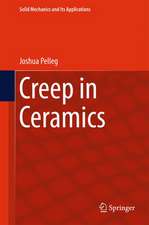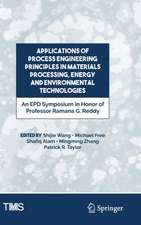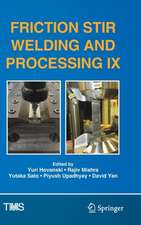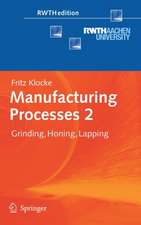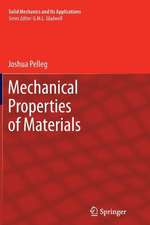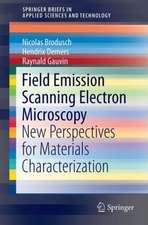Diffusion in Ceramics: Solid Mechanics and Its Applications, cartea 221
Autor Joshua Pellegen Limba Engleză Hardback – 31 aug 2015
The book is composed of two parts, beginning with a look at the basics of diffusion according to Fick's Laws. Solutions of Fick’s second law for constant D, diffusion in grain boundaries and dislocations are presented along with a look at the atomistic approach for the random motion of atoms. In the second part, the author discusses diffusion in several technologically important ceramics. The ceramics selected are monolithic single phase ones, including: A12O3, SiC, MgO, ZrO2 and Si3N4. Of these, three refer to oxide ceramics (alumina, magnesia and zirconia). Carbide based ceramics are represented by the technologically very important Si-carbide and nitride based ceramics are represented by Si-nitride which has been important in high temperature ceramics and gas turbine applications.
The author presents a clear, concise and relatively comprehensive treatment of diffusion in ceramics for use by those at an advanced undergraduate level and beyond. It supports understanding of the basic behavior of materials and how to relate observed physical properties to microscopic understanding. The book also provides researchers with a handy collation of data relating to diffusion in ceramics and supports a fundamental understanding of atomic movements.
| Toate formatele și edițiile | Preț | Express |
|---|---|---|
| Paperback (1) | 398.15 lei 43-57 zile | |
| Springer International Publishing – 23 aug 2016 | 398.15 lei 43-57 zile | |
| Hardback (1) | 402.14 lei 17-23 zile | +37.49 lei 5-11 zile |
| Springer International Publishing – 31 aug 2015 | 402.14 lei 17-23 zile | +37.49 lei 5-11 zile |
Din seria Solid Mechanics and Its Applications
- 20%
 Preț: 698.09 lei
Preț: 698.09 lei - 24%
 Preț: 800.14 lei
Preț: 800.14 lei - 15%
 Preț: 640.06 lei
Preț: 640.06 lei - 15%
 Preț: 653.14 lei
Preț: 653.14 lei - 18%
 Preț: 1124.92 lei
Preț: 1124.92 lei - 15%
 Preț: 643.84 lei
Preț: 643.84 lei - 18%
 Preț: 1119.38 lei
Preț: 1119.38 lei - 20%
 Preț: 573.17 lei
Preț: 573.17 lei - 18%
 Preț: 1607.92 lei
Preț: 1607.92 lei - 17%
 Preț: 393.72 lei
Preț: 393.72 lei - 17%
 Preț: 459.40 lei
Preț: 459.40 lei - 18%
 Preț: 959.98 lei
Preț: 959.98 lei - 18%
 Preț: 747.71 lei
Preț: 747.71 lei -
 Preț: 388.55 lei
Preț: 388.55 lei - 18%
 Preț: 787.15 lei
Preț: 787.15 lei -
 Preț: 406.25 lei
Preț: 406.25 lei - 15%
 Preț: 639.08 lei
Preț: 639.08 lei - 24%
 Preț: 784.82 lei
Preț: 784.82 lei - 15%
 Preț: 643.34 lei
Preț: 643.34 lei - 18%
 Preț: 958.07 lei
Preț: 958.07 lei - 18%
 Preț: 1228.15 lei
Preț: 1228.15 lei - 18%
 Preț: 734.27 lei
Preț: 734.27 lei - 18%
 Preț: 1233.06 lei
Preț: 1233.06 lei - 18%
 Preț: 1236.19 lei
Preț: 1236.19 lei - 18%
 Preț: 950.96 lei
Preț: 950.96 lei - 18%
 Preț: 906.48 lei
Preț: 906.48 lei - 18%
 Preț: 964.54 lei
Preț: 964.54 lei - 20%
 Preț: 995.75 lei
Preț: 995.75 lei - 18%
 Preț: 953.65 lei
Preț: 953.65 lei - 18%
 Preț: 1239.67 lei
Preț: 1239.67 lei - 18%
 Preț: 962.35 lei
Preț: 962.35 lei - 18%
 Preț: 964.54 lei
Preț: 964.54 lei - 18%
 Preț: 913.11 lei
Preț: 913.11 lei - 18%
 Preț: 1226.90 lei
Preț: 1226.90 lei
Preț: 402.14 lei
Nou
Puncte Express: 603
Preț estimativ în valută:
76.95€ • 80.56$ • 63.67£
76.95€ • 80.56$ • 63.67£
Carte disponibilă
Livrare economică 12-18 martie
Livrare express 28 februarie-06 martie pentru 47.48 lei
Preluare comenzi: 021 569.72.76
Specificații
ISBN-13: 9783319184364
ISBN-10: 3319184369
Pagini: 448
Ilustrații: XXII, 448 p.
Dimensiuni: 155 x 235 x 30 mm
Greutate: 0.96 kg
Ediția:1st ed. 2016
Editura: Springer International Publishing
Colecția Springer
Seria Solid Mechanics and Its Applications
Locul publicării:Cham, Switzerland
ISBN-10: 3319184369
Pagini: 448
Ilustrații: XXII, 448 p.
Dimensiuni: 155 x 235 x 30 mm
Greutate: 0.96 kg
Ediția:1st ed. 2016
Editura: Springer International Publishing
Colecția Springer
Seria Solid Mechanics and Its Applications
Locul publicării:Cham, Switzerland
Public țintă
GraduateCuprins
Part A Fundamentals of Diffusion.- 1 Macroscopic Diffusion.- 2 Microscopic (or Atomic) Diffusion.- 3 Defects in Materials.- 4 Mechanism of Diffusion.- 5 Self Diffusion, Solute Diffusion, Diffusion in Ionic Crystals and Correlation Effects.- 6 Interdiffusion.- 7 Diffusion in Grain Boundaries.- 8 Diffusion in Dislocations.- 9 Experimental Methods and Procedures.- 10 Empirical Rules.- Part B Diffusion in Ceramics (Experimental).- 11 Diffusion in Alumina Single Crystals.- 12 Diffusion in Silicon Carbide (Carborundum).- 13 Diffusion in MgO (Magnesia or Periclase).- 14 Diffusion in ZrO2 (Zirconia) Single Crystals.- 15 Diffusion in Si3N4 Single Crystals.- Index.
Notă biografică
Joshua Pelleg received his B.S. in Chemical Engineering Technion Institute of Technology, Haifa, Israel, M. S. in Metallurgy, Illinois Institute of Technology, Chicago, IL, USA and Ph. D. in Metallurgy, University of Wisconsin, Madison, WI. He is with Ben Gurion University of the Negev, Materials Engineering Department, Beer Sheva, Israel since 1970, was among the founders of the department, and its second chairman. Professor Pelleg was the recipient of the Sam Ayrton Chair in Metallurgy. He has taught ever since the subjects of Mechanical Properties of Materials, Diffusion in Solids and Defects in Solids. He has chaired several University committees and served four terms as the Chairman of Advanced Studies in Ben Gurion University. Prior to arriving to BGU, Pelleg acted as Assistant Professor and then Associate Professor in the Department of Materials and Metallurgy, University of Kansas, Lawrence, KS, USA. Professor Pelleg was Visiting Professor in: Department of Metallurgy, Iowa State University, Institute for Atomic Research, US Atomic Energy Commission, Ames, IA, USA, McGill University, Montreal, QC, Canada, Tokyo Institute of Technology, Applied Electronics Dept., Nagatsuta Campus, Yokohama, Japan and in Curtin University, Department of Physics, Perth, Australia. Among his non-academic research and industrial experience one can note: Chief Metallurgist in Urdan Netallurgical Works LTD., Netanya, Israel, Research Engineer in International Harvester, Manufacturing Research, Chicago IL., Associate Research Officer, National Research Council of Canada, Structures and Materials, National Aeronautical Establishment, Ottawa, ON, Physics Senior Research Scientist, Nuclear Research Center, Beer Sheva, Israel. Materials Science Division, Argonne National Labs, Argonne, IL, USA., Atomic Energy of Canada, Chalk River, Ont. Canada, Visiting Scientist, CSIR, National Accelerator Centre, Van de Graaf Group Faure, South Africa, Bell Laboratories, Murray Hill,NJ, USA, GTE Laboratories, Waltham, MA, USA. His current research interests are diffusion in solids, thin film deposition and properties (mostly by sputtering) and characterization of thin films among them various silicides.
Textul de pe ultima copertă
This textbook provides an introduction to changes that occur in solids such as ceramics, mainly at high temperatures, which are diffusion controlled, as well as presenting research data. Such changes are related to the kinetics of various reactions such as precipitation, oxidation and phase transformations, but are also related to some mechanical changes, such as creep.
The book is composed of two parts, beginning with a look at the basics of diffusion according to Fick's Laws. Solutions of Fick’s second law for constant D, diffusion in grain boundaries and dislocations are presented along with a look at the atomistic approach for the random motion of atoms. In the second part, the author discusses diffusion in several technologically important ceramics. The ceramics selected are monolithic single phase ones, including: A12O3, SiC, MgO, ZrO2 and Si3N4. Of these, three refer to oxide ceramics (alumina, magnesia and zirconia). Carbide based ceramics are represented by the technologically very important Si-carbide and nitride based ceramics are represented by Si-nitride which has been important in high temperature ceramics and gas turbine applications.
The author presents a clear, concise and relatively comprehensive treatment of diffusion in ceramics for use by those at an advanced undergraduate level and beyond. It supports understanding of the basic behavior of materials and how to relate observed physical properties to microscopic understanding. The book also provides researchers with a handy collation of data relating to diffusion in ceramics and supports a fundamental understanding of atomic movements.
The book is composed of two parts, beginning with a look at the basics of diffusion according to Fick's Laws. Solutions of Fick’s second law for constant D, diffusion in grain boundaries and dislocations are presented along with a look at the atomistic approach for the random motion of atoms. In the second part, the author discusses diffusion in several technologically important ceramics. The ceramics selected are monolithic single phase ones, including: A12O3, SiC, MgO, ZrO2 and Si3N4. Of these, three refer to oxide ceramics (alumina, magnesia and zirconia). Carbide based ceramics are represented by the technologically very important Si-carbide and nitride based ceramics are represented by Si-nitride which has been important in high temperature ceramics and gas turbine applications.
The author presents a clear, concise and relatively comprehensive treatment of diffusion in ceramics for use by those at an advanced undergraduate level and beyond. It supports understanding of the basic behavior of materials and how to relate observed physical properties to microscopic understanding. The book also provides researchers with a handy collation of data relating to diffusion in ceramics and supports a fundamental understanding of atomic movements.
Caracteristici
Explores many aspects of the diffusion phenomena in modern ceramics Explains the basics of diffusion according to Fick's Laws and looks at the atomistic approach Incorporates research data on diffusion in ceramics Includes many examples of diffusion in technologically important ceramics Includes supplementary material: sn.pub/extras
